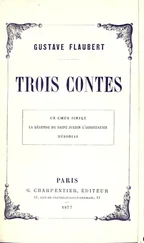Гюстав Флобер - A Simple Soul
Здесь есть возможность читать онлайн «Гюстав Флобер - A Simple Soul» весь текст электронной книги совершенно бесплатно (целиком полную версию без сокращений). В некоторых случаях можно слушать аудио, скачать через торрент в формате fb2 и присутствует краткое содержание. Год выпуска: 2014, Издательство: epubBooks Classics, Жанр: Классическая проза, на английском языке. Описание произведения, (предисловие) а так же отзывы посетителей доступны на портале библиотеки ЛибКат.
- Название:A Simple Soul
- Автор:
- Издательство:epubBooks Classics
- Жанр:
- Год:2014
- ISBN:нет данных
- Рейтинг книги:4 / 5. Голосов: 1
-
Избранное:Добавить в избранное
- Отзывы:
-
Ваша оценка:
- 80
- 1
- 2
- 3
- 4
- 5
A Simple Soul: краткое содержание, описание и аннотация
Предлагаем к чтению аннотацию, описание, краткое содержание или предисловие (зависит от того, что написал сам автор книги «A Simple Soul»). Если вы не нашли необходимую информацию о книге — напишите в комментариях, мы постараемся отыскать её.
A Simple Soul — читать онлайн бесплатно полную книгу (весь текст) целиком
Ниже представлен текст книги, разбитый по страницам. Система сохранения места последней прочитанной страницы, позволяет с удобством читать онлайн бесплатно книгу «A Simple Soul», без необходимости каждый раз заново искать на чём Вы остановились. Поставьте закладку, и сможете в любой момент перейти на страницу, на которой закончили чтение.
Интервал:
Закладка:
Bourais' face must have appeared very funny to Loulou. As soon as he saw him he would begin to roar. His voice re–echoed in the yard, and the neighbours would come to the windows and begin to laugh, too; and in order that the parrot might not see him, Monsieur Bourais edged along the wall, pushed his hat over his eyes to hide his profile, and entered by the garden door, and the looks he gave the bird lacked affection. Loulou, having thrust his head into the butcher–boy's basket, received a slap, and from that time he always tried to nip his enemy. Fabu threatened to ring his neck, although he was not cruelly inclined, notwithstanding his big whiskers and tattooings. On the contrary, he rather liked the bird, and, out of devilry, tried to teach him oaths. Felicite, whom his manner alarmed, put Loulou in the kitchen, took off his chain and let him walk all over the house.
When he went downstairs, he rested his beak on the steps, lifted his right foot and then his left one; but his mistress feared that such feats would give him vertigo. He became ill and was unable to eat. There was a small growth under his tongue like those chickens are sometimes afflicted with. Felicite pulled it off with her nails and cured him. One day, Paul was imprudent enough to blow the smoke of his cigar in his face; another time, Madame Lormeau was teasing him with the tip of her umbrella and he swallowed the tip. Finally he got lost.
She had put him on the grass to cool him and went away only for a second; when she returned, she found no parrot! She hunted among the bushes, on the bank of the river, and on the roofs, without paying any attention to Madame Aubain who screamed at her: "Take care! you must be insane!" Then she searched every garden in Pont–l'Eveque and stopped the passers–by to inquire of them: "Haven't you perhaps seen my parrot?" To those who had never seen the parrot, she described him minutely. Suddenly she thought she saw something green fluttering behind the mills at the foot of the hill. But when she was at the top of the hill she could not see it. A hod–carrier told her that he had just seen the bird in Saint–Melaine, in Mother Simon's store. She rushed to the place. The people did not know what she was talking about. At last she came home, exhausted, with her slippers worn to shreds, and despair in her heart. She sat down on the bench near Madame and was telling of her search when presently a light weight dropped on her shoulder—Loulou! What the deuce had he been doing? Perhaps he had just taken a little walk around the town!
She did not easily forget her scare; in fact, she never got over it. In consequence of a cold, she caught a sore throat; and some time later she had an earache. Three years later she was stone deaf, and spoke in a very loud voice even in church. Although her sins might have been proclaimed throughout the diocese without any shame to herself, or ill effects to the community, the cure thought it advisable to receive her confession in the vestry–room.
Imaginary buzzings also added to her bewilderment. Her mistress often said to her: "My goodness, how stupid you are!" and she would answer: "Yes, Madame," and look for something.
The narrow circle of her ideas grew more restricted than it already was; the bellowing of the oxen, the chime of the bells no longer reached her intelligence. All things moved silently, like ghosts. Only one noise penetrated her ears; the parrot's voice.
As if to divert her mind, he reproduced for her the tick–tack of the spit in the kitchen, the shrill cry of the fish–vendors, the saw of the carpenter who had a shop opposite, and when the door–bell rang, he would imitate Madame Aubain: "Felicite! go to the front door."
They held conversations together, Loulou repeating the three phrases of his repertory over and over, Felicite replying by words that had no greater meaning, but in which she poured out her feelings. In her isolation, the parrot was almost a son, a love. He climbed upon her fingers, pecked at her lips, clung to her shawl, and when she rocked her head to and fro like a nurse, the big wings of her cap and the wings of the bird flapped in unison. When clouds gathered on the horizon and the thunder rumbled, Loulou would scream, perhaps because he remembered the storms in his native forests. The dripping of the rain would excite him to frenzy; he flapped around, struck the ceiling with his wings, upset everything, and would finally fly into the garden to play. Then he would come back into the room, light on one of the andirons, and hop around in order to get dry.
One morning during the terrible winter of 1837, when she had put him in front of the fire–place on account of the cold, she found him dead in his cage, hanging to the wire bars with his head down. He had probably died of congestion. But she believed that he had been poisoned, and although she had no proofs whatever, her suspicion rested on Fabu.
She wept so sorely that her mistress said: "Why don't you have him stuffed?"
She asked the advice of the chemist, who had always been kind to the bird.
He wrote to Havre for her. A certain man named Fellacher consented to do the work. But, as the diligence driver often lost parcels entrusted to him, Felicite resolved to take her pet to Honfleur herself.
Leafless apple–trees lined the edges of the road. The ditches were covered with ice. The dogs on the neighbouring farms barked; and Felicite, with her hands beneath her cape, her little black sabots and her basket, trotted along nimbly in the middle of the sidewalk. She crossed the forest, passed by the Haut–Chene, and reached Saint–Gatien.
Behind her, in a cloud of dust and impelled by the steep incline, a mail–coach drawn by galloping horses advanced like a whirlwind. When he saw a woman in the middle of the road, who did not get out of the way, the driver stood up in his seat and shouted to her and so did the postilion, while the four horses, which he could not hold back, accelerated their pace; the two leaders were almost upon her; with a jerk of the reins he threw them to one side, but, furious at the incident, he lifted his big whip and lashed her from her head to her feet with such violence that she fell to the ground unconscious.
Her first thought, when she recovered her senses, was to open the basket. Loulou was unharmed. She felt a sting on her right cheek; when she took her hand away it was red, for the blood was flowing.
She sat down on a pile of stones, and sopped her cheek with her handkerchief; then she ate a crust of bread she had put in her basket, and consoled herself by looking at the bird.
Arriving at the top of Ecquemanville, she saw the lights of Honfleur shining in the distance like so many stars; further on, the ocean spread out in a confused mass. Then a weakness came over her; the misery of her childhood, the disappointment of her first love, the departure of her nephew, the death of Virginia; all these things came back to her at once, and, rising like a swelling tide in her throat, almost choked her.
Then she wished to speak to the captain of the vessel, and without stating what she was sending, she gave him some instructions.
Fellacher kept the parrot a long time. He always promised that it would be ready for the following week; after six months he announced the shipment of a case, and that was the end of it. Really, it seemed as if Loulou would never come back to his home. "They have stolen him," thought Felicite.
Finally he arrived, sitting bold upright on a branch which could be screwed into a mahogany pedestal, with his foot in the air, his head on one side, and in his beak a nut which the naturalist, from love of the sumptuous, had gilded. She put him in her room.
This place, to which only a chosen few were admitted, looked like a chapel and a second–hand shop, so filled was it with devotional and heterogeneous things. The door could not be opened easily on account of the presence of a large wardrobe. Opposite the window that looked out into the garden, a bull's–eye opened on the yard; a table was placed by the cot and held a wash–basin, two combs, and a piece of blue soap in a broken saucer. On the walls were rosaries, medals, a number of Holy Virgins, and a holy–water basin made out of a cocoanut; on the bureau, which was covered with a napkin like an altar, stood the box of shells that Victor had given her; also a watering–can and a balloon, writing–books, the engraved geography and a pair of shoes; on the nail which held the mirror, hung Virginia's little plush hat! Felicite carried this sort of respect so far that she even kept one of Monsieur's old coats. All the things which Madame Aubain discarded, Felicite begged for her own room. Thus, she had artificial flowers on the edge of the bureau, and the picture of the Comte d'Artois in the recess of the window. By means of a board, Loulou was set on a portion of the chimney which advanced into the room. Every morning when she awoke, she saw him in the dim light of dawn and recalled bygone days and the smallest details of insignificant actions, without any sense of bitterness or grief.
Читать дальшеИнтервал:
Закладка:
Похожие книги на «A Simple Soul»
Представляем Вашему вниманию похожие книги на «A Simple Soul» списком для выбора. Мы отобрали схожую по названию и смыслу литературу в надежде предоставить читателям больше вариантов отыскать новые, интересные, ещё непрочитанные произведения.
Обсуждение, отзывы о книге «A Simple Soul» и просто собственные мнения читателей. Оставьте ваши комментарии, напишите, что Вы думаете о произведении, его смысле или главных героях. Укажите что конкретно понравилось, а что нет, и почему Вы так считаете.








![Гюстав Флобер - Закат Карфагена [Сборник]](/books/414440/gyustav-flober-zakat-karfagena-sbornik-thumb.webp)

